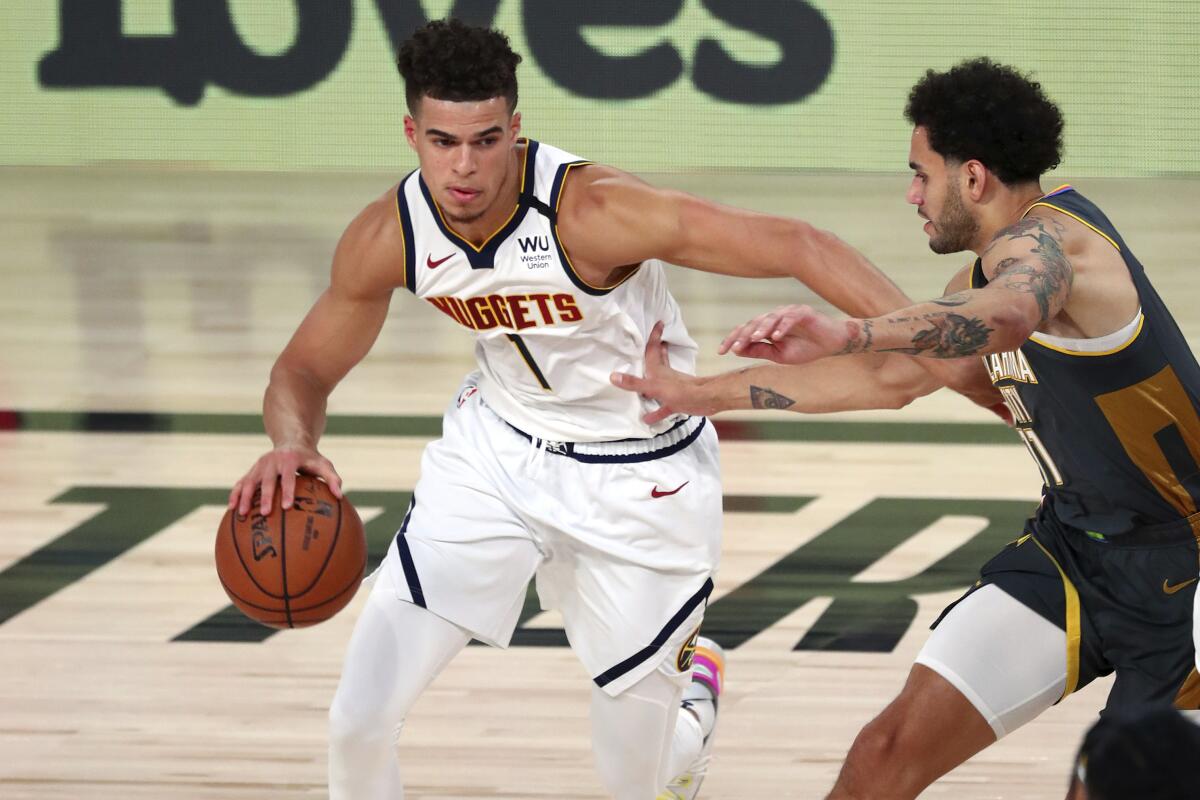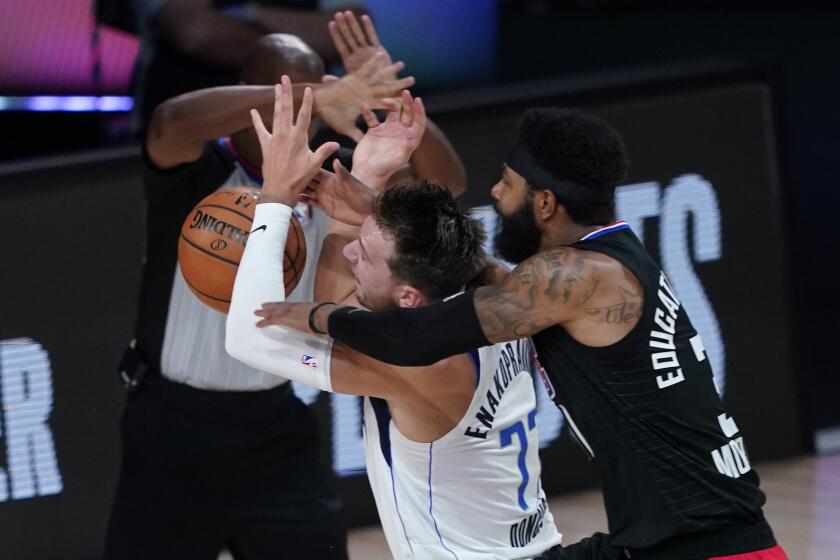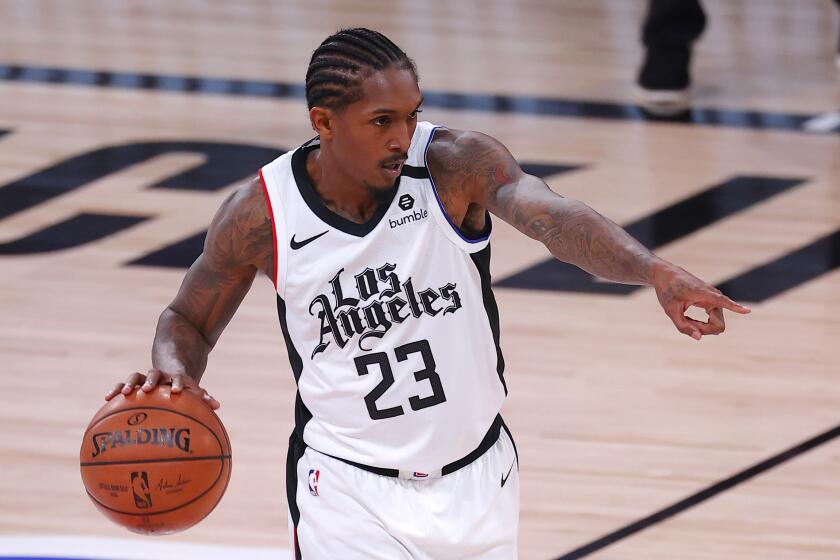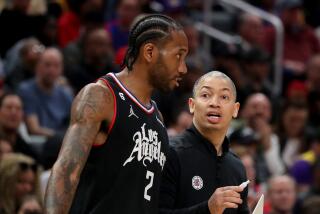Clippers vs. Nuggets preview: The Michael Porter Jr. factor in play

- Share via
Six months after trading franchise cornerstone Blake Griffin to jump-start the transformation of their roster, the Clippers entered the 2018 NBA draft at a decisive juncture.
The Lob City era was over. An ambitious plan to sign superstars and compete for championships was in motion but had only just begun — a process that included how they would use their pair of first-round selections.
The 12th pick was traded to Charlotte to acquire Shai Gilgeous-Alexander, a coveted 6-foot-6 Kentucky point guard who had been selected 11th overall. One pick later, the Clippers selected Boston College guard Jerome Robinson, the Atlantic Coast Conference’s second-leading scorer as a junior.
With the next pick, Denver took Michael Porter Jr., believing more in his potential than his risk. A 6-foot-10 scorer from Seattle, Porter was the best player in the country before back injuries wiped out nearly his entire lone season at Missouri and his status as the consensus top overall pick. One week before the draft, Porter’s pro day was initially called off after he suffered hip spasms.
Porter was on the Clippers’ draft board, but coach Doc Rivers said it was “brutal” trying to project his career.
“The medical report, the red flag was so hot,” Rivers said. The Clippers became the 11th team to pass.
Clippers forward Marcus Morris Sr. is fined $35,000 for ‘recklessly striking’ Dallas guard Luka Doncic above the neck during Game 6 last week.
“We got the one guy we wanted in Shai and then we had that second pick,” he said. “I tell you, when he was on the board it was, it was a brutal pass because everyone in the room knew his talent.”
That talent has been displayed during the league’s restart in Orlando, Fla., where the Clippers will see Porter again beginning with Game 1 of their second-round playoff series Thursday. After sitting out his entire rookie season because of his injuries, Porter moved into the starting lineup in July and provided the kind of shot-creation the Nuggets lacked around the perimeter, averaging 22.0 points, 8.8 rebounds and 42% shooting on three-pointers during the seeding round. He averaged 12.0 points, 7.0 assists and 42% shooting on three-pointers during Denver’s first-round series against Utah.
“He has a big impact,” Clippers star Kawhi Leonard said of Porter. “He can shoot the ball, rebound the ball, bring it up, transition, find guys that are open, create his own shots. ... He also has some size on him. He can rebound on the offensive end, get some put-backs. That’s difficult to guard.”
Porter’s time in the bubble hasn’t been a seamless success. Denver brass spoke with him in July after he said on Snapchat that he believed the coronavirus pandemic was “being used for population control.” He was moved back to the bench in Game 4 of the Jazz series. Porter missed six of his seven shots in Denver’s Game 6 victory Sunday to keep its season alive — while also grabbing 12 rebounds and helped the Nuggets outscore Utah by 12 during his minutes on the court.
“I told him after the game that I was proud of him, because he didn’t allow himself to be a specialist,” Denver coach Mike Malone said afterward.
Neither the Clippers nor Porter seem to view draft night as a what-if moment. The medical report on Porter was so stark it has ruled out much second-guessing, despite his talent.
“Their doctor was the one that wrote the report on me,” Porter said Wednesday. “I think he wrote some stuff like he thought that I would never play basketball again so I didn’t think they’d pick me.”
The picks the Clippers did make also created value — just not as anyone expected in 2018.
With the Clippers waiting for their NBA playoff journey to continue, the welcoming of families to the NBA bubble provides a boost to player morale.
After an NBA All-Rookie first season, Gilgeous-Alexander was part of the package traded to Oklahoma City last summer that acquired Paul George and helped sway the free-agent signing of Leonard. Robinson never flourished with the Clippers after a foot injury derailed his rookie season — he averaged 3.1 points in 10.6 minutes in 75 games — but his inclusion in a three-way trade in February helped the Clippers add starting forward Marcus Morris Sr.
“I didn’t expect them to pick me,” Porter said. “But, I mean, it’s going to be fun to play against them, for sure.”
The Clippers are hoping guard Patrick Beverley, after missing five games because of a strained left calf, will play during the second round and could be available for Game 1, Rivers said, though he stopped short of a guarantee.
Beverley participated in warmups before Wednesday’s practice and “looks pretty good,” Rivers said. He is officially listed as questionable for Game 1.
With Beverley sidelined, the Clippers have started guard Landry Shamet the last four games. The lineup that included Shamet became the most-used of the series for the Clippers, a group that posted a net rating — the difference between points scored and allowed per 100 possessions — of 21.7 together.
Shamet started the first 10 games of the season before missing 17 games with an ankle injury. Upon his return, he see-sawed between the starters and reserves and his minutes fluctuated. The consistency of his role in the postseason produced some of his best play this season: 45% three-point shooting, 8.0 points and only one turnover per game.
“I think it’s been really good for this bubble for me,” Shamet said. “The only thing you got to worry about is basketball. It’s been really easy to be super locked in, ultra locked in on a game plan. Nothing but time to put in the additional work and whatnot.”
More to Read
Get our high school sports newsletter
Prep Rally is devoted to the SoCal high school sports experience, bringing you scores, stories and a behind-the-scenes look at what makes prep sports so popular.
You may occasionally receive promotional content from the Los Angeles Times.









